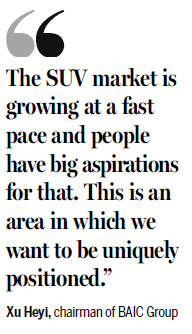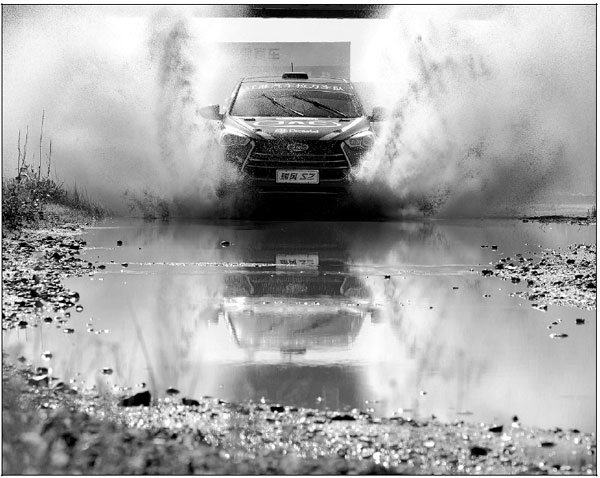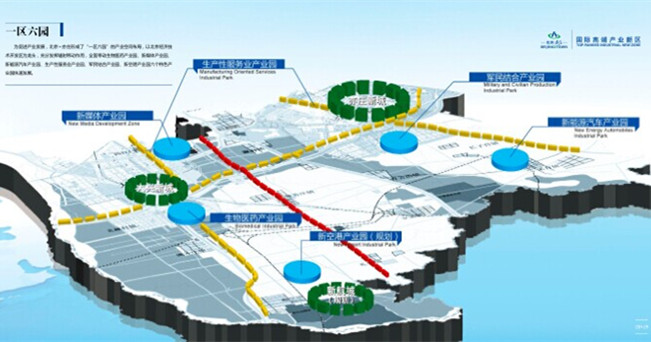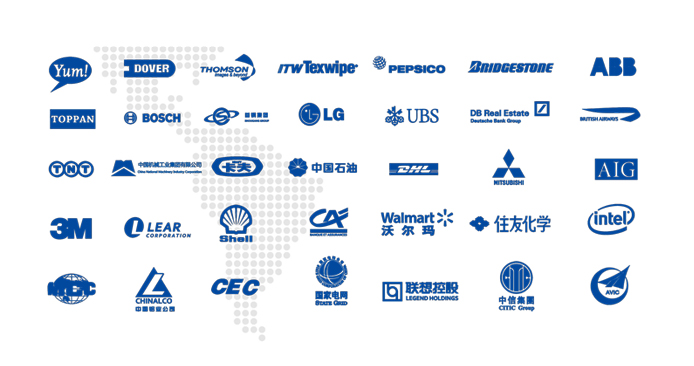Bigger is better, car buyers say
( China Daily )
SUVs, MPVs are popular as drivers seek more space, better driving experience
"Bigger is better," said Xu Junyang, a securities analyst in Beijing, when asked what kind of vehicle he was looking for at a dealership.
As his wife will soon give birth to their second child, the 39-year-old has decided to replace his four-year old five-seat Buick Lacrosse with a larger vehicle.
"Cars with plenty of room are the priority, those that can carry at least three adults, two safety chairs, two baby carriages and a lot more," Xu said.
He is not alone. China's introduction of the second-child policy at the beginning of 2016 has spurred a huge demand for bigger vehicles among young couples.
There were more than 17 million newborn babies last year, of which more than half were second children, soaring by 11 percent compared with the previous year, according to the National Bureau of Statistics.

"Even if we don't have a second child now, buying a big SUV is the long-term plan," said Lin Li, a 26-year-old college graduate in Beijing.
Lin bought a Toyota Highlander this year as her budget excluded the possibility of buying a second car in the coming four or five years.
"Why not consider bigger ones at the outset?" Lin said, adding that she might have two children in the future.
Lin said a bigger car had always been her first choice as her family will have at least seven members, including her parents and parents-in-law.
"For younger buyers, bigger cars have also become a popular choice because they look more cool and driving them brings a feeling of adventure," she said.
Some people who have two children and old parents are shifting toward MPVs, with Volkswagen's Sharan and Honda's Odyssey being popular choices.
Cao Jian, an IT specialist in Beijing, traded up his Volkswagen Sagitar sedan for a seven-seat Odyssey in June.
"I wanted a big SUV, but the comfort and roominess of MPVs finally gained the upper hand," said Cao, whose parents are over 70 years old.
He said MPV bodies are lower and thus more suitable for older passengers and their seats are more comfortable than those of SUVs.
"What impressed my wife and me is that the Odyssey's seats in the second row can be laid flat and you can sleep on them, which is great for both kids and parents," Cao said.
He said the decision came after he test-drove big SUVs including the Toyota Highlander and Peugeot 5008, but their seats were not comfortable enough, and the Volkswagen Teramont was too big for him.
"We don't need great performance or clearance ability; what we need is space and comfort," he added.
However, for those who enjoy self-driving tours, big SUVs such as the Teramont or Toyota Prado are popular.
Wang Lina, a 35-year old businesswoman who is planning a trip to the Tibet autonomous region during the National Day holiday, said big SUVs are a "natural choice" for her.
"You are not worried even if some road sections are poorly surfaced, because SUVs can handle such conditions," said Wang, who often takes her family to suburban areas for fun.
"Besides, there is more legroom in SUVs, so you are less tired than in a sedan if you travel long distances. And I'm told bigger cars are safer if there is an accident," she said.
Statistics from the China Tourism Academy showed that Chinese people made 223 million self-driving trips in the first half of 2017, with the average distance standing at 142.8 kilometers. Of the drivers, more than 80 percent were aged between 31 and 35.
The academy said these people are mainly middle and high-income earners and they are more interested in the travel experience than their destinations.
These trends have driven up sales of SUVs in the past few years. Last year, more than 10 million SUVs were sold, up 13.32 percent year-on-year, according to statistics from the China Association of Automobile Manufacturers.
In the first half of this year, the SUV sector was also the fastest growing in the Chinese auto market, with sales soaring nearly 6.3 percent year-on-year to 4.69 million vehicles.
Even though the growth rate has slowed in the past few months, major carmakers are still ramping up efforts to develop SUV models, sensing demand from people who need to drive on various road conditions across the country.
Beijing Automotive Group Co Ltd, one of China's top five automakers by sales revenue, for example, said it is investing more resources to develop its SUV business.
"The SUV market is growing at a fast pace and people have big aspirations for that. This is an area in which we want to be uniquely positioned," said Xu Heyi, chairman of BAIC Group.
"We will focus on improving off-road vehicle offerings because consumers today have higher demands for their SUVs' functionality," Xu said.
Wang Zilin is one of them. Wang and his wife work in Qingdao in East China's Shandong province, but they travel to their hometown in the rural area of Linyi in the same province two times a month.
Wang said there are rugged road sections during the three-hour drive.
"It is more comfortable to drive a big SUV as it can handle those uneven roads better," he said, adding that the seats on SUVs are higher, allowing drivers to see the road more clearly, which guarantees better views and travel safety.
Contact the writers at chengyu@chinadaily.com.cn
|
An SUV takes part in an international racing event in Zhangye, Northwest China's Gansu province, on July 21. Pei Qiang / For China Daily |
(China Daily 10/01/2018 page9)

 The Area with Six Parks
The Area with Six Parks Global Top 500
Global Top 500